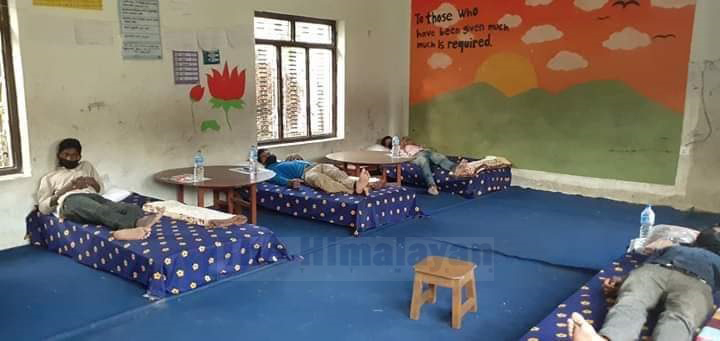‘Quarantined people can suffer mental health problems’
Quarantined people commonly experience fear, uncertainty, sadness, confusion, anger, sleeplessness, anxieties, irritation, low self-esteem and aches and pains
Kathmandu, May 2
While people have been staying in various quarantine centres across the country as per the government protocol amid the coronavirus pandemic, experts say people living in quarantine can suffer mental health problems. They say those in quarantine should be active in order to protect their mental health.
The advice of mental health workers comes immediately after a youth who was in quarantine along with his wife committed suicide in Rautamai Rural Municipality, Udaypur, on April 30. The youth had been living in Kathmandu and had returned home a month after the lockdown was enforced in March-end.
“People living in quarantine can commonly experience fear, uncertainty, sadness, confusion, anger, sleeplessness, anxiety, worries, lack of concentration, irritation, low self-esteem and aches or pains during their stay there. Many of them are likely to suffer from anxiety and depression,” said Dr Saroj Prasad Ojha, professor and Head of Psychiatry Department at Tribhuvan University Teaching Hospital.
There are currently 22,978 people in quarantine across the country. People can be stressed regarding their finances, their duties and responsibilities to their families while living away from their family members and loved ones. They can be filled with fear of financial crisis, unemployment and also the fear of contracting COVID-19.
“There is stigma and discrimination in our society in relation to coronavirus infection.
People are afraid of being discriminated when they go back home from the place of quarantine or after treatment for coronavirus.
Therefore, they might feel helpless. When people have such psychological stress there are chances of them committing suicide, said Dr Ojha.
“People might want to test for COVID-19 for the sake of assurance.”
There are various physical infrastructure and services in each quarantine centre across the country. Therefore people could be stressed in different ways. Some of them might even be stressed due to fear of contracting malaria as there are no nets in the quarantine centres. The quarantine centre could also be difficult for children and pregnant women and this could impact their mental health,” said Dr
Basudev Karki, senior consultant psychiatrist at Mental Hospital, Lagankhel.
People can start using substances such as alcohol to get rid of this distress. There could be increase in intake of alcohol, tobacco or other drugs.
Also, chronic health problems could worsen.
People can take this pandemic as a threat. They feel isolated and this feeling can lead to poor sleep, depressive symptoms and difficulty in focusing and managing their emotions, doctors say.
For people living in quarantine to cope with stress, “They should eat healthy food. Physical exercises can also help to keep oneself active, practising yoga and meditation, sitting under the sun, avoiding negative news and maintaining regular phone contacts with family members will help them. People should seek medical help and counselling if necessary,” said Dr Ojha Experts also say that the government should provide toll free numbers to listen to mental health issues and make the service available roundthe-clock.
They also say they should be provided counselling from mental health workers at quarantine facilities.
“We should look at the health condition, listen to people and link them with the concerned departments to help them with mental health problems. There should be mental health workers assigned to quarantine facilities,” said Dr Karki.
“Those who can’t handle stress could suffer from depression and anxiety.
People might long to meet their family members and loved ones,” said Dr Phanindra Prasad Baral, chief of Non-communicable Diseases and Mental Health Section at Epidemiology and Disease Control Division.
The EDCD has drafted a framework for addressing mental health issues during the period of the coronavirus pandemic. The Mental Health and Psychosocial Support (MHPSS) COVID-19 Preparedness and Response Framework has been designed to integrate mental health services as cross-cutting intervention in the COVID-19 health response of the government.
The framework aims to strengthen primary care services to provide essential mental health services in the aftermath of the COVID-19 pandemic.
The Ministry of Health and Population is, however, yet to endorse it.
A version of this article appears in e-paper on May 3, 2020 of The Himalayan Times.






